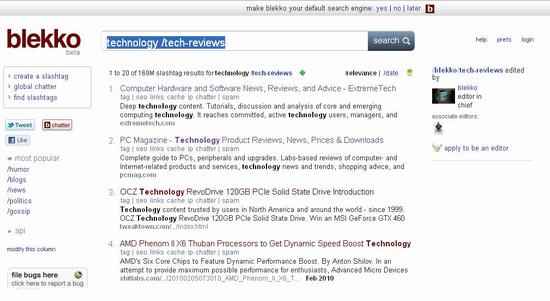Blekko promises to filter your search results to maximize relevance and minimize spam

A new search engine has made its public appearance, a fact in itself worthy of notice in this Google and Bing filtered world. Called Blekko, the service differentiates itself from Google and Bing by using human input to help refine search results, and has launched its public beta today.
 Survey
SurveyLet’s hear what Blekko is all about, straight from the mouth of its CEO, Rich Skrenta:
“”Bing and Google have hundreds of contractors that use web tools to refine this relevance data – classifying porn, spam, domain parks, ecommerce sites, fake 404’s, markov-spam, official sites, and so on…As a 20-person startup, we asked ourselves how blekko could assemble this essential data. Hire contractors? Use Mechanical Turk? Elance? But – of course! – we know a much better way…A way you can get orders of magnitude greater participation, while at the same time being very open about the process. Let the public in.”
[RELATED_ARTICLE]Using what it calls “slashtags”, which are in essence user-specified or preset lists of websites, Blekko allows users to filter their search results by searching within the sites. Spam-ridden sites can be automatically filtered out, but in the end, everything depends on the user’s list of sites. Users will be able to “follow” public slashtags, using them as filters, or contribute to editing them. Some of these public slashtags or site filters are created by Blekko itself (from health, to lyrics, education, finances, hotels, and technology), giving users the opportunity to simply access a vast amount of content in relevant meal-sized bites.

Search results can also be ‘biased’ with slashtags that have such parameters appended to them, such as “liberal” or “conservative” or “science”. For example, the query “racial equality/conservative” might return results from blog and philosophy sites that are more social commentary-like in nature, whereas “racial equality/science” will present you with search results from scientific websites.
In the initial stages, Blekko (the service is based out of blekko.com) hopes to identify the 50 best sites for each of their top 100,000 search categories or slashtags. Other features include an SEO page for each search result, a ‘global chatter’ page that will allow users to discuss sites and will also track updates.
The aim of the service is to clean up search results from search engines like Google and Bing, removing the hundreds of keyword and link heavy spam sites that invade them. It does this by showing results only from trustworthy sites, as decided by the company and the Blekko community.